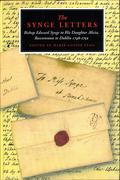Edward Synge wrote 221 letters to Alicia, his daughter, betweeen May and October of 1746 to 1752. He was an adoring though not uncritical father, advising, gossiping and instructing her from his country estate. Synge was a wealthy man and Alicia a considerable heiress; his concern about her need to marry well and her motherless condition is a running, if tacit, theme of the letters. While writing of his life in the diocese, he counsels Alicia on her conduct and mode of life in Dublin; deals with manners and reading matter; with food (how to make good bread) and drink; discusses the false modesty of women and menstruation. He advises her about how to talk to doctors and on matters of taste, house-building and decoration; instructs her on methods of dealing with Dublin tradesmen, the upkeep of his garden and the correct way to plant a border. Throughout this correspondence he describes his Roscommon neighbours and life in the Irish provinces in fascinating detail. These vivid, wide-ranging and sympathetic letters from father to daughter open a window onto social and domestic life in the mid-eighteenth century, revealing lost worlds with the illumination of a Vermeer or a Montaillou. Immediate and richly detailed they constitute a major new source for the history of eighteenth-century Ireland and - in a great age of letter-writing - form an exciting contribution to that most intimate of genres. The letters are fully annotated and accompanied by a biographical register, maps, index, bibliography, and appendix on Synge property and wealth. They will delight the scholar and general reader alike. 'Here, suddenly I felt, was the most extraordinarily revealing and sympathetic historic document that I had encountered in 25 years of research. I reached the end of the correspondence with the feeling that I had entered and understood a culture in the same way as if I had read one of the best epistolatory novels on the 18th century. thanks to the high and calculated litera
-
- Categories
- Other
- Asian Food
- Thai Food
- Italian Food
- Pizza
- BBQ & Grill
- Indian Food
- Chinese Food
- Seafood
- Kebab
- Dessert
- Burgers
- Halal Food
- Drinks
- Salad
- Pasta
- Soup
- Lamb
- Beef
- Spanish Food
- Greek Food
- Pork
- Mexican Food
- Pastry
- Cocktails, Punch & Alcoholic Drinks
- French Food
- Portuguese Food
- British Food
- Moroccan Food
- Chicken
- Chef Recommendation
- Restaurant
- Cafe
- Where to Eat?
- For Home
- Fashion
- Decoration
- Food Products
- Business Services
- New
- Popular
- Gifts
- Videos
- Help / Contact Us
- Terms & Privacy
- What is FoodTerest


